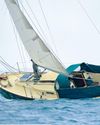Prøve GULL - Gratis
TECHNICAL GOLDEN OLDIES
Yachting Monthly UK
|July 2024
Ken Endean looks back on the boats he has owned over 50 years and explains why the hull lines of older yachts continue to offer first-class handling

Most of Britain’s yacht owners, both now and in the future, will be sailing boats built in the 1960s to 1980s, that are highly durable, structurally sound and capable of being restored and maintained to a high standard at a fraction of the cost of buying a new boat. And because there is a wide choice, potential buyers can take their time to choose a design that handles well – a quality greatly influenced by the hull shape. Amongst older craft, hundreds of Sabre 27s, Alacrity 18s and Hurley 22s are still afloat and capable of taking their owners to Cornwall, France, the Azores or beyond – safely and economically.
Looking back over the last 50 years, I’ve done most of my sailing in those three small yachts. Comparing their lines plans, you can see that the subtleties in their handling characteristics were directly linked to their underwater shapes.
Back in the 1970s, any review of a new yacht was likely to include a lines plan, and the reviewer would comment on its probable behaviour in the open sea. Nowadays, few lines plans are published and many hull shapes are dictated by the need to incorporate two double cabins aft. Reviews may record boat speed at varying wind strengths and wind angles but this is generally on flat-ish water and does not tell us how the craft will behave when a Force 5 is fighting a strong tidal stream in the Bristol Channel – especially if the skipper needs to carry out an emergency gybe. All three of our boats had twin keels, because we enjoy cruising between drying harbours and anchorages. The diagram right shows simplified lines plans, each with one longitudinal buttock line and two transverse sections, one through the forefoot (in the right-hand half of the sections) and one through the quarters (in the left-hand half).
Denne historien er fra July 2024-utgaven av Yachting Monthly UK.
Abonner på Magzter GOLD for å få tilgang til tusenvis av kuraterte premiumhistorier og over 9000 magasiner og aviser.
Allerede abonnent? Logg på
FLERE HISTORIER FRA Yachting Monthly UK

Yachting Monthly UK
ALLURES HORIZON 47
Since 2003 Allures have been building yachts that don't sit neatly in one category or another. Rugged explorer yachts with aluminium hulls, the deck and superstructure are fibreglass and as such allow the boat to feel much less utilitarian than some of its all-metal counterparts. This fourth-generation model seeks to take a fresh look at what a blue-water cruising yachts is.
1 mins
January 2026
Yachting Monthly UK
Check your lifejacket light regularly
I have been fortunate to have been able to practise live night time man-overboard drills, both jumping in and running the training exercise.
1 mins
January 2026

Yachting Monthly UK
CORNISH CRABBER 24 MK3
Far from being a lightweight trailer sailer, Nic Compton finds the third version of this modern classic to be a serious little cruising boat capable of handling far more than a little creek crawling
9 mins
January 2026

Yachting Monthly UK
One day you will...
For those dreaming of the joys of owning a yacht, Nick Ridley offers encouragement as well as a look at the harsher reality of financing your dreams
8 mins
January 2026

Yachting Monthly UK
Magenta Project launches its 2025/26 mentoring program
The Magenta Project has launched the 10th edition of its successful mentoring programme.
1 mins
January 2026

Yachting Monthly UK
OVNI 490
Anyone who has followed the last two editions of the Vendée Globe, or even developments in the Class 40 fleet, will know it's now well understood that, if sailors have good protection on watch, they'll perform better as well as be more comfortable. Similar thinking is being applied to cruising yachts, though this can be complicated by a stronger emphasis on aesthetics.
1 min
January 2026

Yachting Monthly UK
J-BOATS J36
This is an evolution of the popular J/112e, with the deck layout, companionway and cockpit updated. It brings the boat into line with the larger J40 and J45 which have been adapted to have a wider appeal to cruisers as powerful, offshore-capable cruiser-racers.
1 mins
January 2026

Yachting Monthly UK
Research your harbours
The more you know about a place before you get there, the better prepared you will be.
1 min
January 2026

Yachting Monthly UK
SAFFIER SE28 LEOPARD
Family-run Dutch yard Saffier has built a reputation as a builder of achingly stylish, extremely fun and very quick daysailer yachts, with the notable recent addition of a 46ft cruiser to the lineup.
2 mins
January 2026

Yachting Monthly UK
Hurricane Tom
Tom's novel could bear the slogan: 'It reads like a survival guide,' both for dealing with highjackers and hurricanes
3 mins
January 2026
Listen
Translate
Change font size
